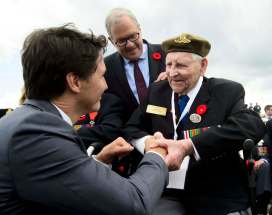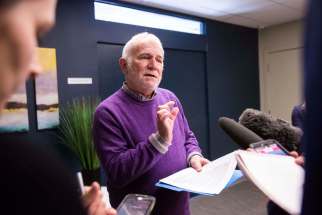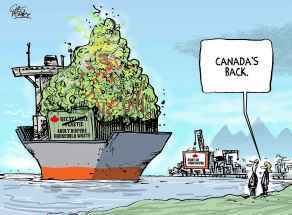Critical failures outlined in health-care update
Read this article for free:
or
Already have an account? Log in here »
To continue reading, please subscribe:
Monthly Digital Subscription
$0 for the first 4 weeks*
- Enjoy unlimited reading on winnipegfreepress.com
- Read the E-Edition, our digital replica newspaper
- Access News Break, our award-winning app
- Play interactive puzzles
*No charge for 4 weeks then price increases to the regular rate of $19.00 plus GST every four weeks. Offer available to new and qualified returning subscribers only. Cancel any time.
Monthly Digital Subscription
$4.75/week*
- Enjoy unlimited reading on winnipegfreepress.com
- Read the E-Edition, our digital replica newspaper
- Access News Break, our award-winning app
- Play interactive puzzles
*Billed as $19 plus GST every four weeks. Cancel any time.
To continue reading, please subscribe:
Add Free Press access to your Brandon Sun subscription for only an additional
$1 for the first 4 weeks*
*Your next subscription payment will increase by $1.00 and you will be charged $16.99 plus GST for four weeks. After four weeks, your payment will increase to $23.99 plus GST every four weeks.
Read unlimited articles for free today:
or
Already have an account? Log in here »
Hey there, time traveller!
This article was published 11/06/2019 (2373 days ago), so information in it may no longer be current.
While it’s commonly associated — incorrectly — with the Hippocratic Oath that binds physicians to a code of ethical conduct, the familiar phrase still serves as an appropriately urgent guideline for all who toil in the medical professions:
“First, do no harm.”
One might be inclined to wonder how the architects of Manitoba’s ongoing health-care restructuring might reflect on that motto, given the damning contents of an interim progress report released this week by Shared Health Manitoba.

Harm, it seems, is very likely being done and will inevitably be done with increasing regularity if the health-care transformation continues on its current trajectory.
The message presented by Nova Scotia-based health consultant Dr. David Peachey’s interim report, “Assessing Phase Two: Healing Our Health System,” stands in stark contrast to the mostly positive assessment offered by the consultant and Health Minister Cameron Friesen last month after Dr. Peachey and members of his consulting firm had spent several weeks in Manitoba conducting interviews with administrators and front-line workers.
“In all of the people we talked to, there was an absolute consensus that the plan is right,” Dr. Peachey said on May 10. “The timelines may be off, but the plan is right.”
Mr. Friesen agreed, of course: “Our confidence in the plan to improve patient outcomes was largely validated today by Dr. Peachey, who said almost all stakeholders agreed we are on the correct path.”
‘Phase Two should be paused immediately while the underpinning process undergoes “repair and restore” activities’–excerpt from 72-page report on Winnipeg hospital reform
The text of the 72-page document offers a stark contrast:
“Phase Two should be paused immediately while the underpinning process undergoes ‘repair and restore’ activities.”
“Workload and staffing instability in the nursing workforce are significant and not sustainable.”
“Seriously low morale…”
“Overall, confidence has been lost in Phase Two.”
The plan for health-care transformation was created in 2015 by Dr. Peachey at the behest of the province’s previous NDP administration, and was set in motion in 2017 by the Progressive Conservative government led by Premier Brian Pallister. Both governments had come to the well-considered conclusion that Manitoba’s health-care regime had become unsustainable, and the PCs opted to act on the report’s recommendations shortly after being elected.
A number of things happened on the way to the grim situation outlined in Dr. Peachey’s “Phase Two” assessment, however: first, the Pallister government chose to pair an exhaustive and complex transformation process with an austerity agenda that forced those tasked with transformation to seek targeted efficiencies at the same time they were undertaking massive restructuring; second, the process was apparently implemented (according to Dr. Peachey) “by directive rather than reasoned consultation”; and third, the tight deadlines placed on the restructuring created uncertainty, “previously unknown levels of stress” and staffing shortages among front-line medical staff, particularly nurses.‘Satisfactory resolutions are not pending or, at this point, foreseen’–Dr. David Peachey
The report describes a particularly critical situation at Concordia Hospital, which had its emergency department converted to an urgent care centre on June 3. Staffing destabilization and the departures of key personnel in advance of the original plan to downgrade Concordia’s ER to a walk-in clinic at the end of June have left the facility with a long list of inadequacies that led Dr. Peachey to conclude that “satisfactory resolutions are not pending or, at this point, foreseen.”
With the Pallister government fully expected this week to impose a pre-election communications blackout and set a September date for a provincial election, it will be interesting to see how the premier and his health minister deal with the interim report’s call for an urgently needed pause in the health-care restructuring.
Further mishandling of the file could do great harm to the PCs’ re-election campaign message.













